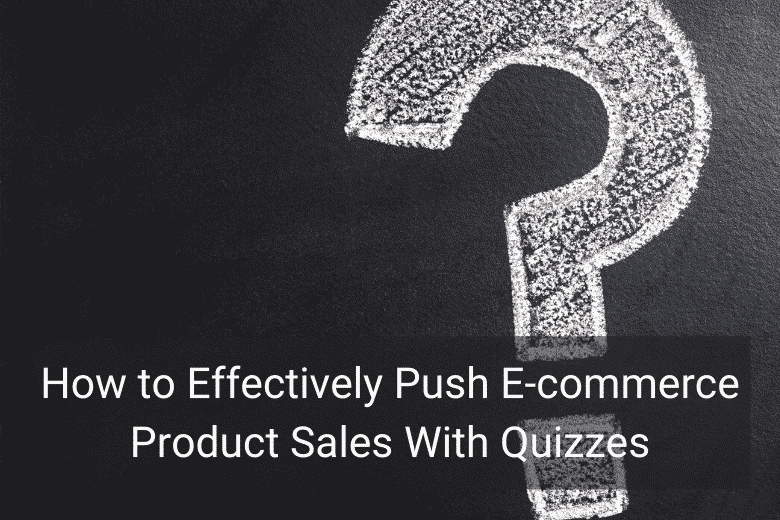If you were a potato, what kind would you be? Roasted, cooked – would you be french fries? There’s no shame in admitting that we all have taken a quiz or two while at work. But while finding out which holiday destination matches your personality best, there is a brand learning valuable information about you, and benefitting from it. Let’s see how to effectively push e-commerce product sales with quizzes, and how it works.
No matter how many chat options or filters an online retailer has, the experience for a customer can never be as personal as in a physical store. The attention an employee can give to whoever walks into the shop, asking the right questions and finding the product that fits their needs best, is what often closes the deal. How can you mimic that online?
With a quiz!
There are many new technologies improving e-commerce bussines, but personalizing your e-commerce site to offer tailored products for individual visitors can increase conversions by 30%. Personalization software is expensive, difficult to implement and can scare visitors off. Here’s how quizzes can improve your product sales.
Marketers are beginning to use quizzes as an effective method of providing targeted product recommendations. The results and data help generate leads and increase e-commerce sales. Making an online quiz is rather simple, but the effects can be surprisingly big.
We divide the formats of these quizzes into two categories: personalizing shopping experiences, and raising awareness. Let’s look at two ways to implement quizzes in your strategy to drive sales and grow your business, and the necessary steps to take for successful quizzing – without cheating to effectively push e-commerce product sales with quizzes.

1. Showing Personalized Product Lines Through Quiz Results
Dividing your visitors into categories based on personality traits (related to your brand) – enables you to offer them a personalized shopping experience, which – unsurprisingly – has shown to convert better than generalized suggestions.
Instead of showing them your whole assortment of products (overwhelming!) and letting them search and apply filters themselves (annoying!), you can suggest products that match their personality and preferences based on their answers.
This personal approach helps establish a connection with your customer – suddenly your webshop isn’t made for the masses anymore but seems to be tailor-made – just for them. You can either recommend a single product or assign your potential customer to a personality group that corresponds to a range of products, as a real in-store employee would.
2. Use A Quiz To Raise Awareness And Promote your Product
How much do you actually know about baby proofing your house? Parents to be are either experienced and confident, but newbies will want to make sure they are going to do this right, and click.
We often think we know it all, but when push comes to shove, we are pretty unprepared for some situations. Especially for brands in the health, home or safety business, a quiz can be a useful tool to raise awareness about situations in which customers could use their product.
Make people think about what they would or should do, and in the results of your quiz, link to the products that you offer that they would need for that. That’s right: make them rationalize. This will encourage your audience to make purchases based on common sense. Can’t argue with that, right?
Five steps to creating a successful quiz
It can be fun to find out what Friends characters your customers would be, and this might help in building a relationship, but it won’t increase sales directly. Here are the five steps you need to take to create effective quizzes that help your business by helping your customers.
1. Set a goal to Push Product Sales
Unless you really want to know what kind of potato your customers would be, set an objective. Based on what you want to accomplish with your quiz in terms of driving product sales, you can set measurable goals to monitor the success of your efforts.
2. Choose a title for your quiz
Quizzes should be fun: forget the formats of tests and exams in high school. Your title should be clear about the result the quiz will give but don’t be afraid to throw a little humour or personality in there. Make sure your quiz title sparks some curiosity.
Also, don’t make it too obvious what you are trying to do. Sure, the results of the quizzes will give you insights into your customers, but first and foremost, you should give them the feeling they are the ones getting more insights – in themselves. You can go two ways here:
Which/What … Are You?
This template for quiz titles is the most fun one. From Disney villains, holiday go-ers, plants, friendship type, skin types – these formats are perfect to drive engagement while getting to know your customers’ desires, needs, issues and whatnot.
How Much Do You Actually Know About…?
Actually is the keyword here: it suddenly sounds like a challenge. People think they know a lot, but this subtle additional word in the sentence makes all the difference in the intonation. A challenge grabs the attention of your audience like nothing else, and attention sparks action.

3. Choose the type of quiz you want to create
In line with the previous step, you can choose between two types of quizzes, based on your goals. You can either test personality, or knowledge.
Testing personality
Now, when we say personality, we don’t mean a complete psychological evaluation. It’s about what people identify with, what resonates with them, and sometimes it is something as practical as if they have dry or oily skin.
Whatever you’re going for with this kind of quiz, make sure you are not judgemental and rather positive about any outcome. You don’t want people to feel unhappy with any of the results – we like to hear what’s good about our quirks, and if there is something to work on, make sure to sound positive, hopeful, and confident that you can help.
Testing knowledge
Now, before you go all-in with your expertise and knowledge and create the quiz of all quizzes: you don’t want to make your (potential) customers feel stupid. These kinds of quizzes are not really to test knowledge, but more to raise awareness, to make people question certain things.
Hold back on very technical questions, and rather focus on situations that your target group experiences: which problems do your products solve? How much do they actually know about healthy eating, fire safety in your house, getting your garden winter ready? Subtly weave in solutions they must know about, and finish with linking the right products.
4. Write clear questions, in the right tone of voice.
The actual questions of your quiz are where you connect with your audience: this is the moment wherein a physical store, a shop employee would make a personal connection with a customer and ask what they are looking for.
Human to human
To effectively push e-commerce product sales with quizzes don’t be afraid to be personal: this will strengthen the feeling that you can actually help, that you are actually trying to find out what’s up with your audience, and that the outcome will be personalized.
You don’t want to make your questions too dry. Avoid technical terms that don’t resonate with the normal language of your target group. Write the questions as you would say them. Try spicing up your quiz with images, videos or gifs, to give it less of an exam-feeling.
Keep it short
Chances are that your audience is taking your quiz while they’re on the go, having a break or they just coincidentally stumbled upon your quiz. Not everyone has ten minutes to spare, so limit your quiz to about 6 to 8 questions, which will come down to 2-3 minutes of their time.

h
5. The extra push
Based on the outcome of your quiz, you’ve been able to expose your audience to your products in a more personalized way, as described earlier. But why stop there?
If you can get your audience to share the results of their quiz, more people might take it, and discover the products that fit their needs and wishes.
Someone might not want to share with the world that they have frizzy hair, but match this trait to a celebrity that seemingly is the same, and your audience might just share it.
Can’t convert them into buying customers immediately, or are you looking at upselling? With the right marketing automation in place, the effects of a good quiz don’t stop after the results are shared.
Need a shipping solution?
Floship is an e-commerce order fulfillment provider based in Hong Kong. We help emerging e-commerce brands store, pick, pack and deliver their orders worldwide from our warehouses in either Hong Kong, Shenzhen or Europe. Reach out by filling out our Get Global Solutions form and one of our solution experts will get back to you with a solid shipping solution.

Ready To Upgrade Your Logistic Solution?
Speak to Floship ecommerce logistic consultant about improving your global support chain today





